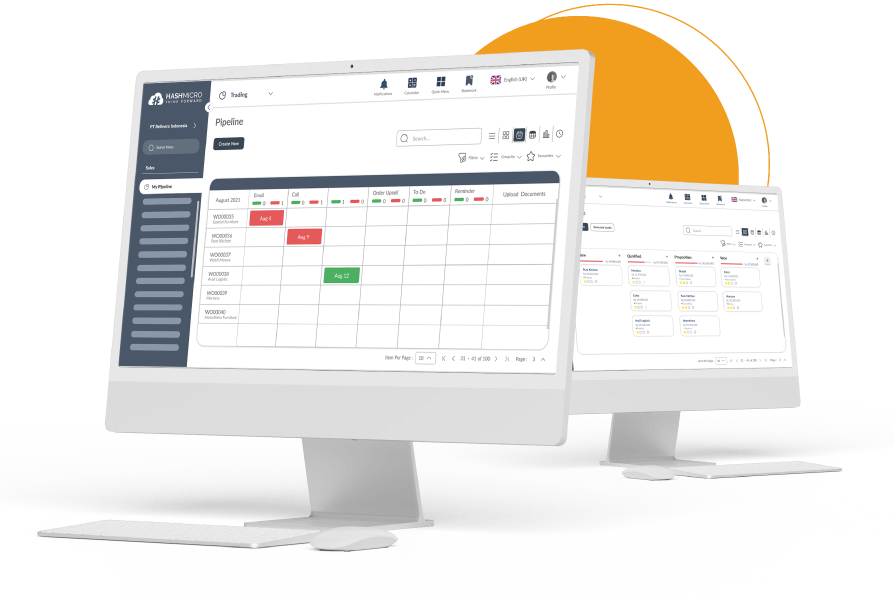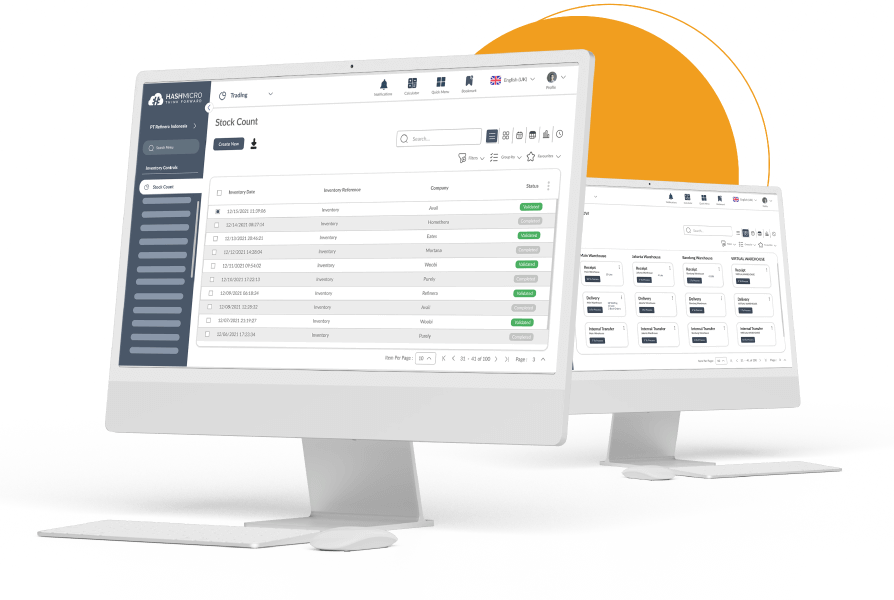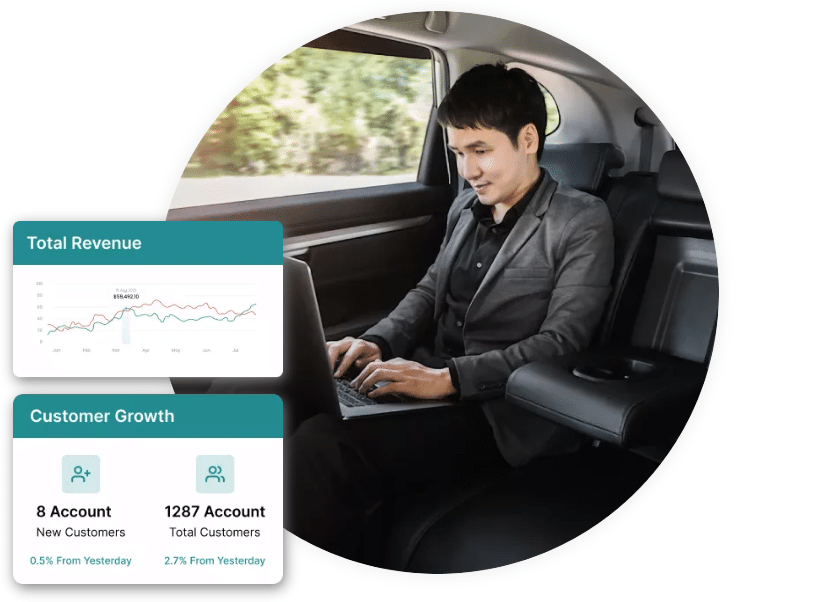Have you ever found yourself navigating through the complex web of inventory management, order processing, and supply chain challenges within the trading and distribution industry? This is where ERP for trading and distribution industry plays a crucial role in streamlining operations and driving efficiency.
In Singapore’s dynamic business landscape, trading and distribution companies face mounting challenges. From my professional experience, I’ve seen how real-time reporting issues, inefficient multi-location management, and weak document management and data security can hinder growth without the right ERP solution.
Join us as we delve into the pivotal role of Enterprise Resource Planning (ERP) systems in revolutionizing the trading and distribution industry. With HashMicro ERP, you can try a free demo now and experience its benefits in overcoming industry challenges. In line with this, this article will discuss ERP systems for the trading and distribution industry. Read on to explore more!
Key Takeaways
|
Importance and Benefit of ERP for the Trading and Distribution Industry
Enterprise Resource Planning (ERP) software is essential for the trading and distribution industry. ERP distribution management software integrates key functions such as real-time reporting, multi-location management, document handling, and auditing, providing a centralized platform for all data and processes.
Implementing distribution management software within an ERP system isn’t just a technological upgrade—it’s a vital strategy that helps businesses stay competitive, adapt to changes, and succeed in a complex marketplace. In my professional experience, I’ve witnessed how the right ERP solution can transform distribution operations and drive long-term growth.
By addressing specific industry needs, ERP distribution management software significantly improves efficiency and profitability for distribution businesses. For example, the bigger a business gets, the more its system needs to keep up. Like when a wholesale business gets larger, it needs more comprehensive wholesale distribution software to help its integration into all the business processes.
Easier upselling

ERP systems simplify upselling efforts by providing a consolidated view of customer data and purchase history. Sales teams can leverage this information to identify cross-selling and upselling opportunities more effectively across the distribution channel for B2B sales growth. With a comprehensive understanding of customer preferences, businesses can tailor their offerings, improving the success rate of upselling strategies and enhancing customer satisfaction.
Monitoring of stock transfer
ERP systems in the trading and distribution sector offer a critical advantage in real-time monitoring of stock transfers. These systems enable businesses to track inventory movements across different locations or warehouses. By ensuring accurate and up-to-date information on stock transfers, companies can prevent delays, reduce the risk of stockouts, and maintain a smooth and efficient supply chain.
Inventory level optimization

ERP systems are pivotal in optimizing inventory levels, a key concern for trading and distribution businesses. ERP systems use advanced forecasting and demand planning tools to analyze historical data and market trends. This analysis helps businesses maintain optimal stock levels, minimize holding costs, and improve overall inventory management. By avoiding excess or insufficient stock, companies can enhance order fulfillment and customer satisfaction.
All around analysis
ERP systems offer comprehensive analysis by integrating data from various business functions. From sales and finance to inventory and customer relations, these systems provide real-time reporting and analytics. This integrated approach empowers decision-makers with a holistic perspective of the business. Through data-driven insights, businesses can make informed strategic decisions, address operational challenges, and capitalize on opportunities for growth and improvement.
Key Features of ERP for Trading Businesses

Enterprise Resource Planning (ERP) systems bring key features that are particularly beneficial for trading businesses. In my professional experience, I’ve seen how these features empower companies to streamline processes, improve decision-making, and gain a stronger competitive edge. Here are some essential features:
Interactive dashboard
ERP systems for trading businesses often come equipped with interactive dashboards. These dashboards provide a visual representation of key performance indicators (KPIs), allowing stakeholders to monitor real-time data, track trends, and make data-driven decisions. The interactive nature enhances user experience, facilitating quick access to critical information and fostering a more agile and responsive business environment.
Real-time reporting
ERP systems offer real-time reporting and analytics, providing trading businesses with actionable insights into sales, inventory, and financial data. This empowers decision-makers to make informed and timely decisions, helping to stay ahead in a dynamic market.
Multi-location operations
For trading businesses with operations spanning multiple locations, ERP facilitates centralized control and coordination. It ensures uniformity in processes, enables seamless communication, and allows for efficient resource management across different branches or warehouses.
Document management
ERP systems help organize and manage crucial documents related to transactions, contracts, and compliance. This not only ensures data integrity but also facilitates easy retrieval and sharing of documents, contributing to a more streamlined workflow.
Auditing and data security
ERP systems incorporate robust security measures to protect sensitive business data. Additionally, they offer audit trails and compliance features, ensuring that trading businesses can maintain transparency, trace changes, and meet regulatory requirements.
Another important factor is the prices. If you want to see a tailored pricing scheme that could suit your needs, click the banner below!
Top 5 Modules of ERP for Trading Application Vendors
For a trading application vendor, implementing an Enterprise Resource Planning (ERP) system with the right modules is crucial for optimizing business processes. As a professional who has observed how ERP transforms trading operations, I can affirm that selecting the right modules is key to maximizing efficiency and growth. Here’s an overview of the top 5 modules tailored for such vendors:
CRM

CRM modules in ERP systems for trading applications are essential for managing customer interactions. These modules enable vendors to track customer interactions, manage leads, and streamline sales processes. By centralizing customer data, CRM functionalities facilitate personalized communication and effective customer engagement, ultimately enhancing customer satisfaction and loyalty.
E-procurement
E-procurement modules streamline the procurement process for trading application vendors. These modules automate and digitize purchasing goods and services, improving efficiency and reducing manual errors. E-procurement functionalities typically include supplier management, requisition processing, and order approval workflows, ensuring a seamless procurement cycle and fostering better supplier relationships.
Finance and Accounting

Finance and accounting modules within ERP systems are fundamental for managing financial transactions, budgeting, and reporting. For trading application vendors, robust financial tools ensure accurate revenues, expenses, and profitability tracking. These modules also aid compliance with financial regulations and provide comprehensive insights through financial reporting, supporting informed decision-making.
Inventory and warehouse
Given the nature of trading, efficient inventory and warehouse management system is critical. ERP modules for inventory and warehouse management help vendors track stock levels, monitor product movements, and optimize warehouse operations. Real-time visibility into inventory enables better demand forecasting, reduces stockouts, and enhances overall supply chain efficiency.
Asset management
Asset management modules are key in tracking and maintaining valuable assets for trading application vendors. This includes managing both physical and digital assets, ensuring optimal utilization, and minimizing the risk of loss or damage. Asset management functionalities also contribute to compliance with industry regulations and provide insights for strategic decision-making regarding asset investments.
Selecting the Right ERP for Your Trading and Distribution Business
Choosing the right ERP for a trading business is a critical decision that directly affects operational efficiency and overall success. Begin with a comprehensive needs assessment, pinpointing key challenges like inventory management and supply chain complexities, while ensuring compatibility with wholesale distribution software for seamless operations.
Assess the ERP system’s scalability to ensure it can grow with your business and prioritize integration capabilities with existing software such as accounting software. Look for a user-friendly interface and customization options to tailor the system to your unique processes.
Consider features like real-time reporting, supplier/customer portals, and mobile accessibility for enhanced communication and flexibility. In my professional expertise, I’ve found that evaluating the level of support and training an ERP vendor provides is just as critical to ensure a smooth and successful implementation.
Lastly, factor in the total cost of ownership, including initial implementation costs and ongoing expenses. By carefully weighing these considerations, you can make an informed decision that aligns with your business needs, setting the stage for improved efficiency, customer satisfaction, and sustained growth in a competitive market.
Conclusion
In conclusion, the adoption of Enterprise Resource Planning (ERP) systems proves indispensable for the trading and distribution industry. These systems offer a suite of benefits ranging from easier upselling to efficient inventory management and comprehensive business analysis.
For businesses seeking a tailored ERP solution, HashMicro ERP stands out as a reliable partner committed to addressing the unique needs of trading and distribution enterprises. Based on my professional insights, I’ve seen how HashMicro ERP delivers flexibility and scalability that truly empower businesses to grow and stay competitive.
We invite you to explore our free demo to experience how HashMicro ERP can elevate your business operations. Witness the power of seamless upselling, real-time stock transfer monitoring, optimized inventory levels, and all-encompassing data analysis. Empower your business with HashMicro ERP – where efficiency meets innovation. Request your free demo today and embark on a journey towards enhanced productivity and success!
FAQs ERP for Trading and Distribution Industry
-
How does ERP help in optimizing inventory management for trading and distribution businesses?
ERP systems utilize advanced forecasting and demand planning tools to analyze historical data and market trends. This analysis enables businesses to maintain optimal stock levels, minimize holding costs, and improve overall inventory management by avoiding excess or insufficient stock.
-
What role does real-time reporting play in enhancing decision-making for trading companies using ERP systems?
Real-time reporting in ERP systems provides actionable insights into sales, inventory, and financial data. This empowers decision-makers to make informed and timely decisions, helping businesses stay ahead in a dynamic market. The integrated approach offers comprehensive, all-around analysis, aiding in strategic decision-making.
-
How does ERP facilitate multi-location operations and coordination for trading businesses?
ERP systems for trading businesses offer centralized control and coordination for operations spread across multiple locations. This ensures uniformity in processes, enables seamless communication, and allows for efficient management of resources across different branches or warehouses.
-
In what ways does ERP contribute to document management and data security for trading companies?
ERP systems help organize and manage crucial documents related to transactions, contracts, and compliance. This ensures data integrity and facilitates easy retrieval and sharing of documents, contributing to a more streamlined workflow. Additionally, ERP systems incorporate robust security measures to protect sensitive business data.
-
How does ERP support efficient upselling efforts in the trading and distribution sector?
ERP systems simplify upselling efforts by providing a consolidated view of customer data and purchase history. Sales teams can leverage this information to identify cross-selling and upselling opportunities more effectively. With a comprehensive understanding of customer preferences, businesses can tailor their offerings, improving the success rate of upselling strategies and enhancing customer satisfaction.
{
“@context”: “https://schema.org”,
“@type”: “FAQPage”,
“mainEntity”: [{
“@type”: “Question”,
“name”: “How does ERP help in optimizing inventory management for trading and distribution businesses?”,
“acceptedAnswer”: {
“@type”: “Answer”,
“text”: “ERP systems utilize advanced forecasting and demand planning tools to analyze historical data and market trends. This analysis enables businesses to maintain optimal stock levels, minimize holding costs, and improve overall inventory management by avoiding excess or insufficient stock.”
}
},{
“@type”: “Question”,
“name”: “What role does real-time reporting play in enhancing decision-making for trading companies using ERP systems?”,
“acceptedAnswer”: {
“@type”: “Answer”,
“text”: “Real-time reporting in ERP systems provides actionable insights into sales, inventory, and financial data. This empowers decision-makers to make informed and timely decisions, helping businesses stay ahead in a dynamic market. The integrated approach offers comprehensive, all-around analysis, aiding in strategic decision-making.”
}
},{
“@type”: “Question”,
“name”: “How does ERP facilitate multi-location operations and coordination for trading businesses?”,
“acceptedAnswer”: {
“@type”: “Answer”,
“text”: “ERP systems for trading businesses offer centralized control and coordination for operations spread across multiple locations. This ensures uniformity in processes, enables seamless communication, and allows for efficient management of resources across different branches or warehouses.”
}
},{
“@type”: “Question”,
“name”: “In what ways does ERP contribute to document management and data security for trading companies?”,
“acceptedAnswer”: {
“@type”: “Answer”,
“text”: “ERP systems help organize and manage crucial documents related to transactions, contracts, and compliance. This ensures data integrity and facilitates easy retrieval and sharing of documents, contributing to a more streamlined workflow. Additionally, ERP systems incorporate robust security measures to protect sensitive business data.”
}
},{
“@type”: “Question”,
“name”: “How does ERP support efficient upselling efforts in the trading and distribution sector?”,
“acceptedAnswer”: {
“@type”: “Answer”,
“text”: “ERP systems simplify upselling efforts by providing a consolidated view of customer data and purchase history. Sales teams can leverage this information to identify cross-selling and upselling opportunities more effectively. With a comprehensive understanding of customer preferences, businesses can tailor their offerings, improving the success rate of upselling strategies and enhancing customer satisfaction.”
}
}]
}


































